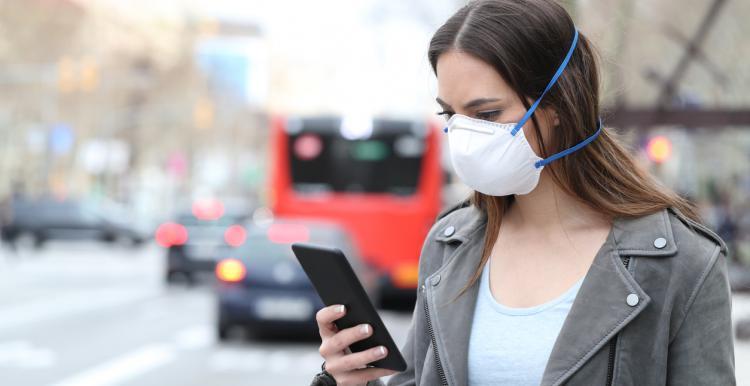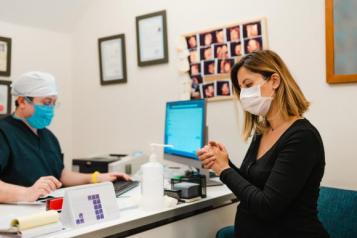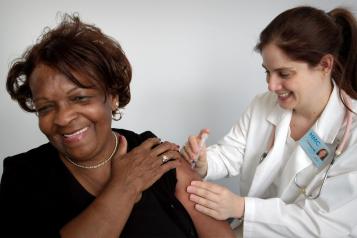How the new NHS COVID-19 app offers better data privacy

Since the COVID-19 pandemic started, there has been much talk about the potential benefits of using mobile technology to help quickly contain any new infections. But there has also been a lot of debate about the privacy and security issues such an approach could raise.
This week, the NHS has announced the second pilot of a contact-tracing app. We look at what people told us about the first pilot, the concerns we raised and how the new app, if it passes testing, should address many of these issues.
We feel confident that the new app prioritises the safety and privacy of its users.
The backstory
The development of a workable app that can support COVID-19 contact-tracing is seen as an important tool that could help England transition out of lockdown while preventing a large scale increase in COVID-19 cases.
A mobile app that can help trace people who have been in contact with someone with COVID-19 has significant potential benefits for patients, if it is used appropriately and by a large enough proportion of the population. From our past research, we know that most people are happy for the NHS to use personal health data to improve others’ health, especially if they know that the data will be kept anonymous and will only be used for the specific purpose to which they have given consent.
However, we also know that past missteps involving the use of personal data have negatively affected public trust when it comes to data-sharing. During the development of the first NHS COVID-19 app, we highlighted several privacy and security issues which we believed would need to be addressed to maintain public trust and, in turn, make sure enough people used it.
Public concerns during the first pilot
Between May and June 2020, the first contact-tracing app was piloted on the Isle of Wight.
In comments shared with Healthwatch Isle of Wight, the public initially expressed a high level of support for the app and willingness to engage with the trial, though they also raised questions about user privacy and the risk of exacerbating health inequalities for those who couldn’t access the app.
But as time went on, Healthwatch Isle of Wight reported that a lack of communication about the outcomes of the pilot and improvements that would be made as a result led to a shift in public opinion, with many people feeling frustrated by the lack of information.
Users of the app also reported problems:
- Some users received a contact alert immediately after downloading the app
- Some reported that despite logging symptoms via the app, people they had been in contact with did not receive an alert
- Some who received a genuine contact alert said they were left feeling uncertain as they expected to be told to self-isolate but instead were directed to government guidance or to NHS 111, which didn’t always advise them to go into isolation.
Healthwatch England shared these issues with senior NHS leaders and Government, as well as other questions we had around the limitations on the use of data collected through the app, decision-making around the data storage model, and accountability and governance.
Six questions about data privacy and security
Throughout the app’s development, we have argued that to ensure the app’s success, the public will need to feel confident that they understand the answers to the following questions:
- What data will the app capture?
- How will my data be captured?
- How will my data be used?
- Who will have access to my data?
- How long will my data be stored?
- What happens to anyone who misuses my data?
The first trial version of the app stored users’ data on a central database, in contrast to many other countries where contact-tracing apps were designed on a model where data stayed on users’ phones. This left a lot of unanswered questions about exactly how long data would be stored for and what purposes it could be used for.
We wrote to the NHS asking for clear answers to these questions. Following the initial trial, the app’s launch was delayed so that the concerns raised by Healthwatch and other stakeholders, as well as problems identified in the pilot, could be addressed.
The new app addresses many issues
A new version of the COVID-19 app is now being tested, and residents in the Isle of Wight and Newham will be asked to download the app, as will those who have registered as NHS volunteers.
How the app works
The new app uses Bluetooth technology to work out if you have spent time near other app users who have tested positive for COVID-19 through your smartphone’s existing features.
An app user who tests positive for COVID-19 can choose if they want other app users to be alerted. A random unique ID will then be used to alert other app users who were in close contact with that person. This ensures that if you test positive for COVID-19, your privacy and identity are protected.
The new app includes several improvements. The app:
- Collects only the first part of your postcode and does not collect any other data which could be used to identify you;
- Uses a decentralised data storage model, which means that data about where you’ve been and other users you’ve been close to does not leave your phone and cannot be accessed by any other individual;
- Deletes all the data it has collected from your phone within 21 days; and
- Directs you to self-isolate for the recommended period if you report any potential COVID-19 symptoms and links directly to a website where you can order a COVID-19 test. You can also choose to get your test results via the app.
Since the app collects very little information and the app will be used exclusively for contact-tracing purposes with no centralised access to any data collected, we feel confident that the new app prioritises the safety and privacy of its users.
The app’s effectiveness will be evaluated during the testing period, and further changes may be made to improve it based on user feedback and response. If the app proves to be effective, it will then be made available for the wider public to download.
Features offered by the app
The app offers several features including:
- Letting users know the level of coronavirus risk in their postcode district;
- Alerting users if they have recently visited a venue where they may have come into contact with someone who later tests positive with COVID-19;
- Allowing users to check if they have coronavirus symptoms and see if they need to order a free test;
- Helping users book a free test through the app and get results quickly to know whether they have COVID-19; and if users are told to self-isolate,
- Providing a timer feature to help countdown the self-isolation period and access to relevant advice.


